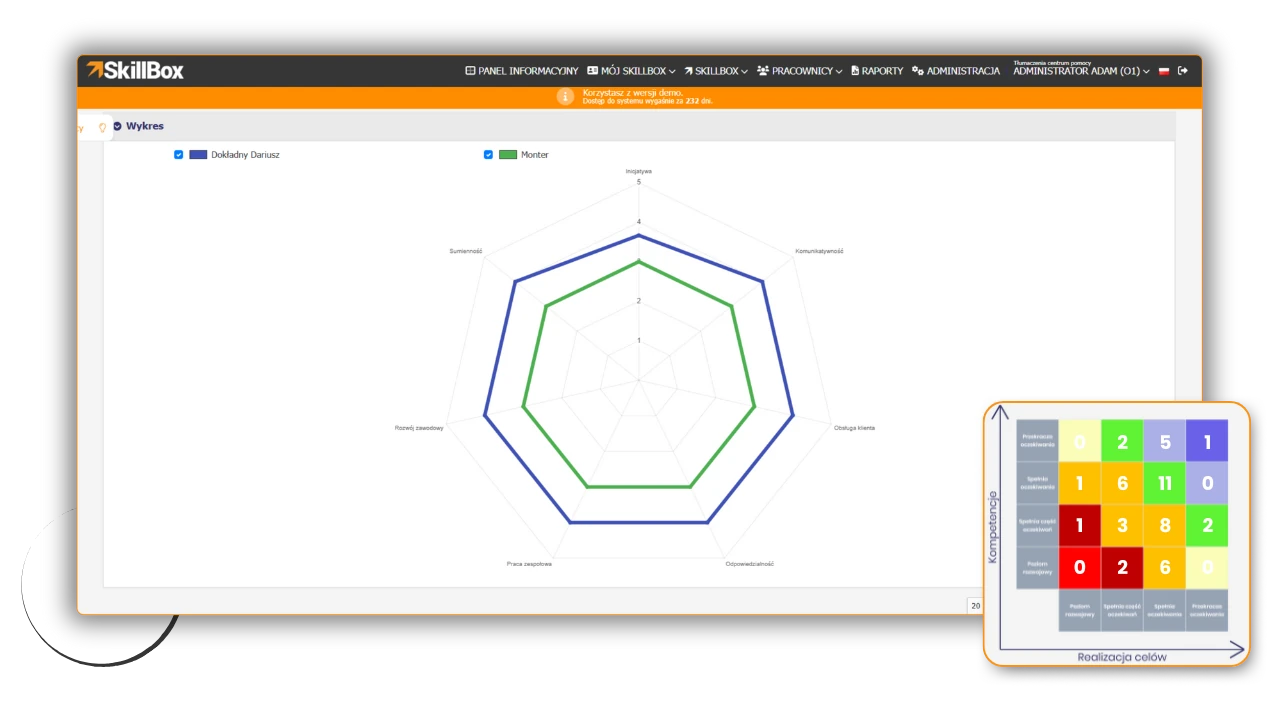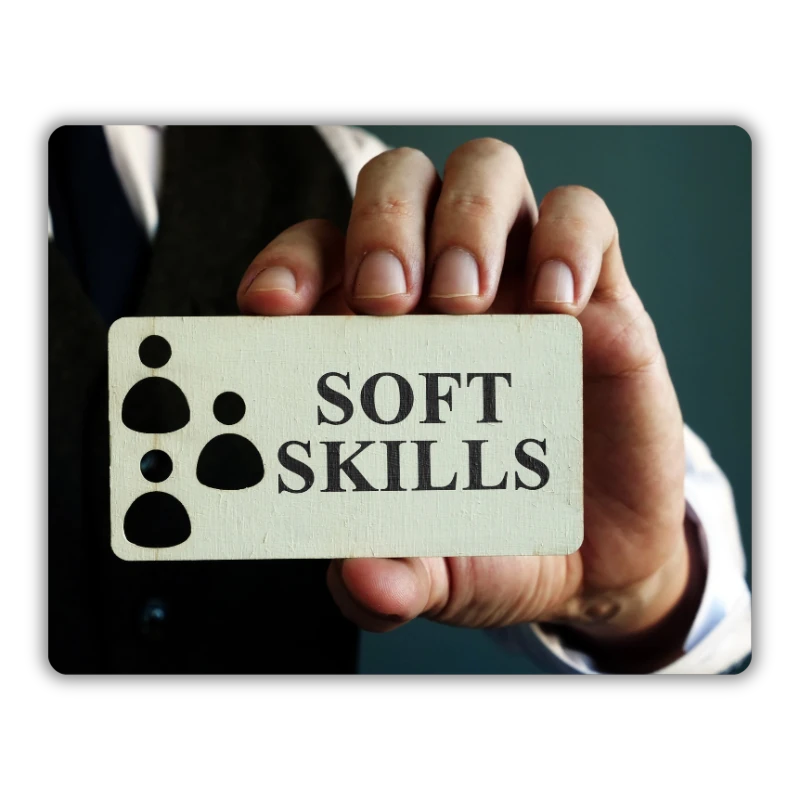Soft skills – can they be measured?

There is increasing emphasis not only on specialist knowledge but also on how we work with others, how we communicate, respond to stress, or manage our time. These are the so-called soft skills, which are gaining importance among recruiters. However, many people still wonder whether it is possible to assess them objectively at all. Thanks to tools such as the SkillBox Competency Matrix, the answer is: yes, and with great precision.
What are soft skills?
Soft skills, also known as competences, are a set of abilities that influence how we act in professional as well as social environments. They concern our interactions with other people, coping with emotions, and adapting to changing circumstances.
The most commonly listed soft skills include:
- – effective communication,
- – empathy and listening skills,
- – time management,
- – mental resilience,
- – teamwork,
- – creativity,
- – conflict resolution,
- – leadership and influence.
When faced with the question „What are soft skills?”, it’s worth remembering that, although these skills are not measurable in the classic way, their importance in the workplace cannot be overstated.
Soft skills vs. hard skills – what’s the difference?

Hard skills are abilities that are easy to verify – for example, proficiency in a program, a foreign language, or operating a specific tool. Soft skills, on the other hand, concern our personality, approach to people, and the way we operate in situations that require communication or emotion management.
Contrary to appearances, soft skills are not less important. Many companies admit that the lack of soft skills often poses the greatest obstacle to an employee’s development or the effective functioning of a team.
Why is it hard to measure soft skills?
Assessing soft skills has always been a challenge, mainly because they concern behaviors, attitudes, and personality traits, which cannot be easily expressed in numbers or criteria. Unlike hard skills – which can be confirmed through certificates, tests, or exams – abilities like empathy, communication, or creativity manifest in context, social situations, and often depend on the observer’s interpretation.
The greatest challenge in measuring soft skills is subjectivity. What one manager considers “assertiveness”, another may see as “contentiousness”. SkillBox addresses this thanks to its unique ability to ask behavioral questions. These allow for objective assessment of competences and the introduction of evaluation standards.
The absence of unified evaluation standards means traditional HR methods are often based on intuition and descriptive assessments, which are difficult to compare. That’s why there is a need for a structured, repeatable, and transparent tool, such as the SkillBox Skills Matrix. This is particularly important for professional talent management.
Is it possible to measure soft skills? Absolutely yes!
Until recently, it was believed that soft skills are too subjective to assess accurately. However, with technological advancement and analytical tools, there are now reliable ways to do so. An excellent example is the SkillBox Skills Matrix – a module that allows for the assessment of competences, their development, and tracking progress.
Thanks to this, soft skills become measurable, and their development can be planned in the same way as technical knowledge.
Manage your competencies in a planned manner and schedule a no-obligation consultation SkillBox Competency Matrix.
How does the SkillBox Skills Matrix work?
SkillBox offers a tool that enables the assignment of proficiency levels to each skill, both hard and soft. This works through clear competency levels assigned to specific behaviors or skills.
How does SkillBox operate? Above all, it:
- defines the required skills for a particular position,
- allows assessment of employees’ current competences,
- identifies gaps and development needs,
- tracks progress over time.
The Skills Matrix allows for the addition of events, i.e., situations involving the employee. Thanks to SkillBox, you can not only plan the development of these competences but also monitor progress over time, all through a clear matrix.
Event registration supports the objectivity of competence assessment and is useful during periodic employee reviews. The evaluation is based on specific, defined criteria, making the result not dependent on the subjective opinion of a single manager.
A periodic evaluation system that is objective
The periodic evaluation system in SkillBox has been designed for reliable and objective measurement of both hard and soft competences. An important element of this system is the possibility to create personalized behavioral questions, related to professional situations and employee behavior.
Instead of generic assessments like “good team player”, users can configure questions such as: “Describe a situation in which you had to resolve a conflict in the team. What actions did you take and what was the outcome?”
Such questions allow for a more accurate understanding of the context in which a competence manifests, and they also limit the influence of subjective evaluations.

Why measure soft skills?
Measuring these skills is a tool for team management and talent development. What benefits does the company gain?
- Better job fit, because people with well-developed social competences perform excellently in leadership or consulting roles.
- More effective teams, thanks to a better understanding of strengths and weaknesses.
- Greater engagement, as employees feel recognized and know that the company invests in their development.
Soft skills – the future you can’t ignore…

In the coming years, soft skills will become the most important on the job market. Technical skills can eventually be automated, but empathy, creativity, or communication are competences that cannot be replaced by an algorithm.
Therefore, it’s worth investing in the development of soft skills today, both individually and organizationally. Tools like SkillBox support and greatly facilitate this process.
Conclusion
Soft skills are an essential element of professional success. Although for years they were considered difficult to assess, thanks to solutions such as the SkillBox Competency Matrix, it is now possible to measure them and consciously develop them. If you care about building effective teams and supporting employee careers, don’t ignore this area. Soft skills can (and should) be measured, and SkillBox will help you with this.
You may be interested in:
How the Succession Matrix Protects Workforce Security
Document Workflow in a Company – How to Streamline Processes with an Electronic System?
Employee Evaluation in Manufacturing – How to Do It Effectively with the Skill Matrix?
DO YOU WANT TO KNOW MORE?
PLEASE VISIT OUR FACEBOOK, LINKEDIN AND YOUTUBE
References:
- https://pl.wikipedia.org/wiki/Kompetencja
- Fastnacht, Danuta. „Miękkie kompetencje w zarządzaniu.” Zeszyty Naukowe Wyższej Szkoły Zarządzania Ochroną Pracy w Katowicach (2006)
We have a gift for you!
You can test managing of human capital with professional Competency Matrix in spreadsheet.

